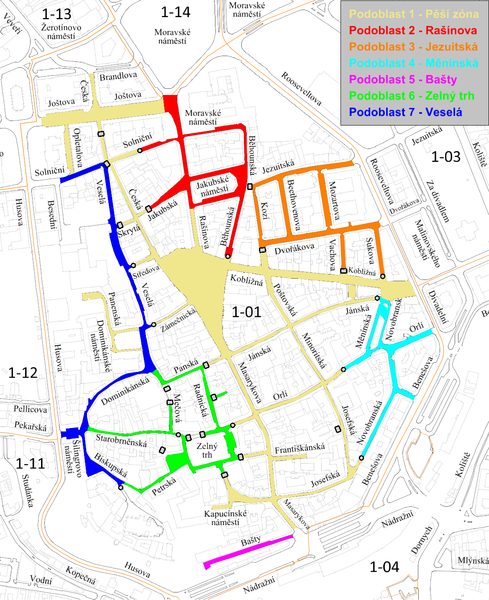Thessaloniki gets ready for its metro launch in November
The underground rapid transit lines have been under construction for almost two decades due to various project delays
 TheMayor.EU logo
TheMayor.EU logo New rules for entering the historical centre will apply from 1 September
Last week Brno announced new restrictions to car entrance in its city centre. The purpose of the changes in the system is motivated by the desire of the local authorities in the Czech city to reduce car traffic in the historical zones and increase safety in the pedestrian ones. The new measures will be in force from 1 September 2020.
If we were to mention something positive about the coronavirus pandemic that hit Europe a few months ago, it is the visible reduction of car traffic, and the improved quality of air and living environment associated with it. Now that the pandemic seems to be subsiding, many cities are reluctant to see their centres overtaken by cars again.
What is more, the recommended anti-Covid-19 norm of keeping 1,5 metres of interpersonal distance obliges authorities to search for solutions that ensure more space for pedestrians. The situation is no different in Brno, Czechia, where the problem with car access to the historical centre had been dragging long time before the epidemic enforced social isolation.
Now that most of the vehicle entry permits are about to expire, the city wants to use the occasion and make the process of obtaining new ones more difficult, making the beauty and convenience of the central areas an exclusive privilege for pedestrians. Hence, a new system based on sub-sectorial division and justification for entry will start operating.
This way, centre of Brno will be divided into sub-areas, with drivers being able to move only within the one they were allowed to enter. The granting of entry permits will be tightened. From the autumn, no authorization will be required only in the Veselá sub-area, so that people can get to the underground garages in Velký Špalíček.
 As of 1st September, Brno’s historical centre will be divided into seven sub-areas and drivers will have very limited access outside of the places they live or work. Image by City of Brno
As of 1st September, Brno’s historical centre will be divided into seven sub-areas and drivers will have very limited access outside of the places they live or work. Image by City of Brno
Drivers will have to prove the purpose of the journey to the centre and entry will only be allowed to the sub-area in which they live, do business or need to carry out other important activities (ex. emergency, delivery, care and social services). Authorizations will be issued for short periods of time, rather than automatically for one year as is the case now.
By restricting car access to the central areas, the second-largest Czech city joins an elite club of municipalities with no-go zones for polluting vehicles, among which are Barcelona, Paris, Brussels and others.

The underground rapid transit lines have been under construction for almost two decades due to various project delays

Now you can get your wine in Talence by paying directly in Bitcoin

That’s because the state has to spend money on updating the railway infrastructure rather than subsidizing the cost of the popular pass

Rethinking renewable energy sources for the urban landscape

The examples, compiled by Beyond Fossil Fuels, can inform and inspire communities and entrepreneurs that still feel trepidation at the prospect of energy transition

Now you can get your wine in Talence by paying directly in Bitcoin

The 10th European Conference on Sustainable Cities and Towns (ESCT) sets the stage for stronger cooperation between the EU, national and local level to fast track Europe's transition to climate neutrality.

At least, that’s the promise made by the mayor of Paris, Anne Hidalgo

The underground rapid transit lines have been under construction for almost two decades due to various project delays

At least, that’s the promise made by the mayor of Paris, Anne Hidalgo

Hostal de Pinós is located in the geographical centre of the autonomous region

Despite its church-y name, the district has long been known as the hangout spot for the artsy crowds

Urban dwellers across the EU are having a say in making their surroundings friendlier to people and the environment.

Forests in the EU can help green the European construction industry and bolster a continent-wide push for architectural improvements.

Apply by 10 November and do your part for the transformation of European public spaces

An interview with the Mayor of a Polish city that seeks to reinvent itself

An interview with the newly elected ICLEI President and Mayor of Malmö

A conversation with the Mayor of Lisbon about the spirit and dimensions of innovation present in the Portuguese capital














